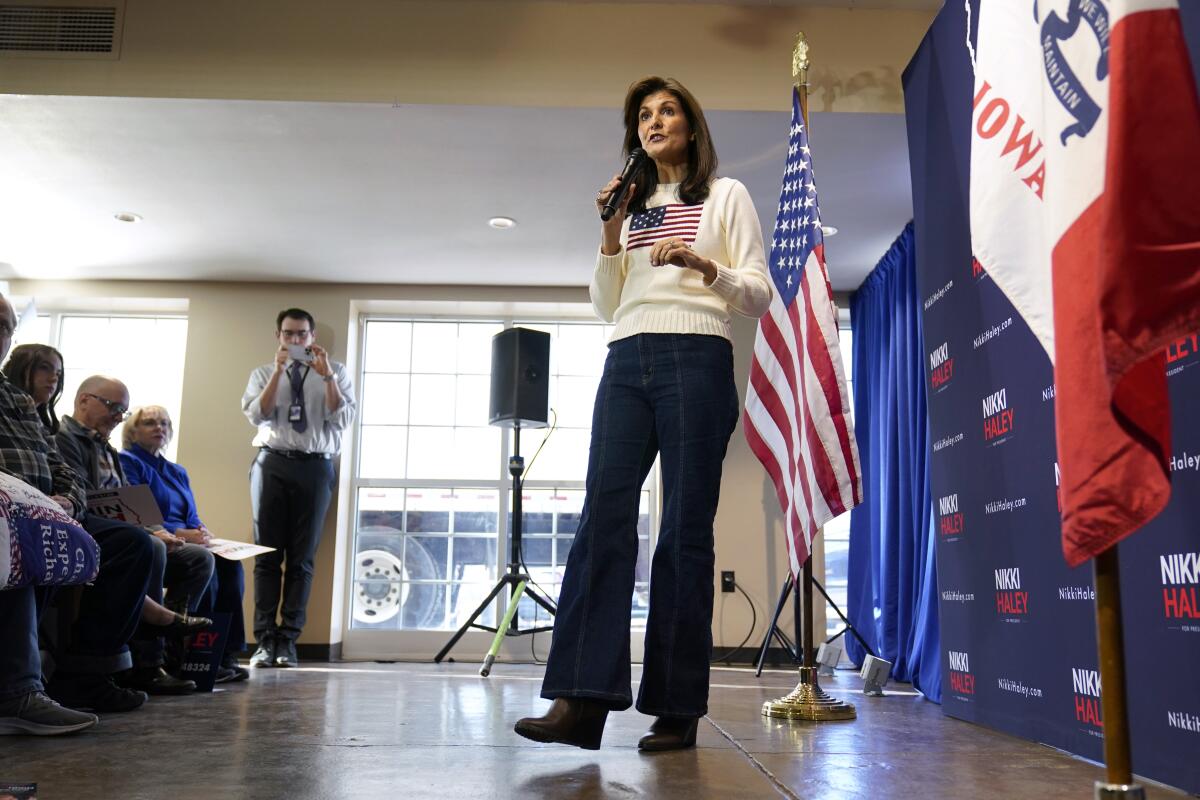Nikki Haley, asked what caused the Civil War, leaves out slavery. It’s not the first time

COLUMBIA, S.C. — Republican presidential candidate Nikki Haley was asked by a New Hampshire voter about the reason for the Civil War, and she didn’t mention slavery in her response — leading the voter to say he was “astonished” by her omission.
Asked during a Wednesday night town hall in Berlin, N.H., what she believed had caused the war — the first shots of which were fired in her home state of South Carolina — Haley talked about the role of government, replying that it involved “the freedoms of what people could and couldn’t do.”
She then turned the question back to the man who had asked it. He replied that he was not the one running for president and wished instead to know her answer.
After Haley went into a lengthier explanation about the role of government, individual freedom and capitalism, the questioner seemed to admonish Haley, saying, “In the year 2023, it’s astonishing to me that you answer that question without mentioning the word ‘slavery.’”
“What do you want me to say about slavery?” Haley retorted before abruptly moving on to the next question.
But 12 hours later, Haley walked back her comments, with her campaign disseminating a Thursday morning radio interview in which she said, “Of course the Civil War was about slavery,” something she called “a stain on America.” She went on to reiterate that “freedom matters. And individual rights and liberties matter for all people.”
Haley, who served six years as South Carolina’s governor, has been competing for a distant second place to Donald Trump for the 2024 Republican presidential nomination. She has frequently said during her campaign that she would compete in the first three states before returning “to the sweet state of South Carolina, and we’ll finish it” in the Feb. 24 primary.
The campaign of Florida Gov. Ron DeSantis, another of Haley’s GOP foes, recirculated video of the original exchange on social media, adding the comment, “Yikes.”
DeSantis faced criticism of his own over slavery early in the campaign, when Florida enacted new education standards requiring teachers to instruct middle school students that slaves developed skills that “could be applied for their personal benefit.” U.S. Sen. Tim Scott of South Carolina, the only Black Republican in the Senate and DeSantis’ then-rival for the GOP presidential nomination, rejected that characterization, saying instead that slavery was about “separating families, about mutilating humans and even raping their wives.”
Issues surrounding the origins of the Civil War and its heritage are still much of the fabric of Haley’s home state, and she has been pressed on the war’s origins before. As she ran for governor in 2010, Haley, in an interview with a now-defunct activist group then known as The Palmetto Patriots, described the war as between two disparate sides fighting for “tradition” and “change” and said the Confederate flag was “not something that is racist.”
During that same campaign, she dismissed the need for the flag to come down from the Statehouse grounds, portraying her Democratic rival’s push for its removal as a desperate political stunt.
Five years later, Haley urged lawmakers to remove the flag from its perch near a Confederate soldier monument following a mass shooting in Charleston, S.C., in which a white gunman killed nine Black church members who were attending Bible study. At the time, Haley said the flag had been “hijacked” by the shooter from those who saw the flag as symbolizing “sacrifice and heritage.”
South Carolina’s Ordinance of Secession — the 1860 proclamation by the state government outlining its reasons for seceding from the Union — mentions slavery in its opening sentence and points to the “increasing hostility on the part of the non-slaveholding States to the institution of slavery” as a reason for the state removing itself from the Union.
On Wednesday night, Christale Spain — elected this year as the first Black woman to chair South Carolina’s Democratic Party — said Haley’s response was “vile, but unsurprising.”
“The same person who refused to take down the Confederate Flag until the tragedy in Charleston, and tried to justify a Confederate History Month,” Spain said in a post on X, of Haley. “She’s just as MAGA as Trump,” Spain added, referring to Trump’s ”Make America Great Again” slogan.
Jaime Harrison, current chairman of the Democratic National Committee and South Carolina’s party chairman during part of Haley’s tenure as governor, said her response was “not stunning if you were a Black resident in SC when she was Governor.”
“Same person who said the confederate flag was about tradition & heritage and as a minority woman she was the right person to defend keeping it on state house grounds,” Harrison posted Wednesday night on X. “Some may have forgotten but I haven’t. Time to take off the rose colored Nikki Haley glasses folks.”
More to Read
Get the L.A. Times Politics newsletter
Deeply reported insights into legislation, politics and policy from Sacramento, Washington and beyond. In your inbox three times per week.
You may occasionally receive promotional content from the Los Angeles Times.










